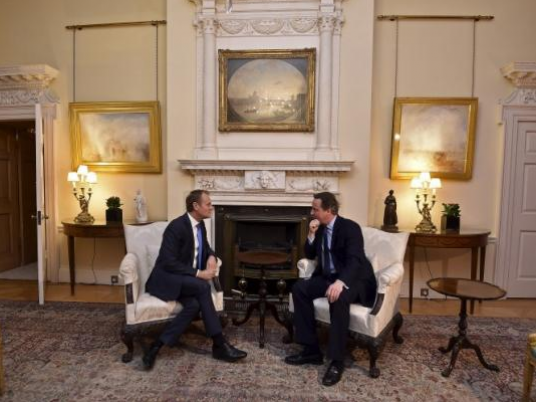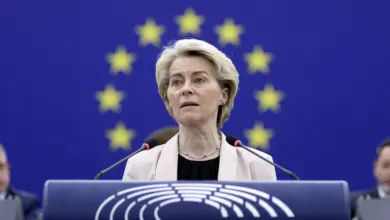
Britain has reached an agreement with European Union officials on a mechanism to block unwanted EU legislation, a source in Prime Minister David Cameron's office said on Tuesday, in a deal that meets one of Cameron's four main reform targets.
European Council President Donald Tusk later on Tuesday will publish a draft proposal for reforms to the EU designed to satisfy a series of demands made by Britain ahead of a planned referendum on the country's membership in the 28-country bloc.
Included in the draft text, which still needs to be agreed by all member states, will be a legally binding provision to allow a group of 55 percent or more member states to either stop EU legislation outright or demand changes, the source said.
Cameron has promised to reform Britain's ties with the EU and hold a public vote on membership before the end of 2017. He hopes to finalize the reforms at a February 18-19 summit.
British Foreign Secretary Philip Hammond said the discussions had been encouraging but a final deal would need further negotiations.
"It may be that the document is so good that we say: 'Yes brilliant'. But I rather doubt it," Hammond told reporters in Rome late on Monday. "I suspect that the document will be the basis of further work that we need to do in the run up to the Council. But we will see."
He said if Britain did get a deal at the February summit of EU leaders then Cameron could call a referendum for June 23.
New law to block power in Brussels
The agreement on a means to block EU laws is designed to address concerns among Britons that too much lawmaking power has been ceded to Brussels. Member states will have three months to object to proposed new laws, the source said.
"This breakthrough will ensure that national parliaments’ voices are heard loud and clear in Brussels," the source said.
Tusk's draft text, due to be released around midday, will provide the basis for a deal at the summit later this month, but both British and EU officials have stressed that many of the finer details have yet to be worked out
Cameron also wants to address issues around competitiveness, closer integration within the euro zone single currency area and, most controversially, immigration.
Britain said on Sunday that a "significant" agreement had been reached with the European Commission, the EU's executive arm, allowing Britain to suspend some payments to migrants from the bloc for four years immediately after the referendum.
However, Britain's two best-selling newspapers on Tuesday gave an indication of the tough job Cameron would have to convince voters that his renegotiation had achieved meaningful changes, particularly over immigration which is a key concern among Britons.
"Is that it then, Mr Cameron?" the Daily Mail said on its front page.
The Sun tabloid said in its editorial: "The PM (prime minister knows it won't meaningfully cut numbers. So does everyone else. It's designed to sound tough, to fool voters, to conceal the fact Britain has no real power to improve its lot within the EU."




